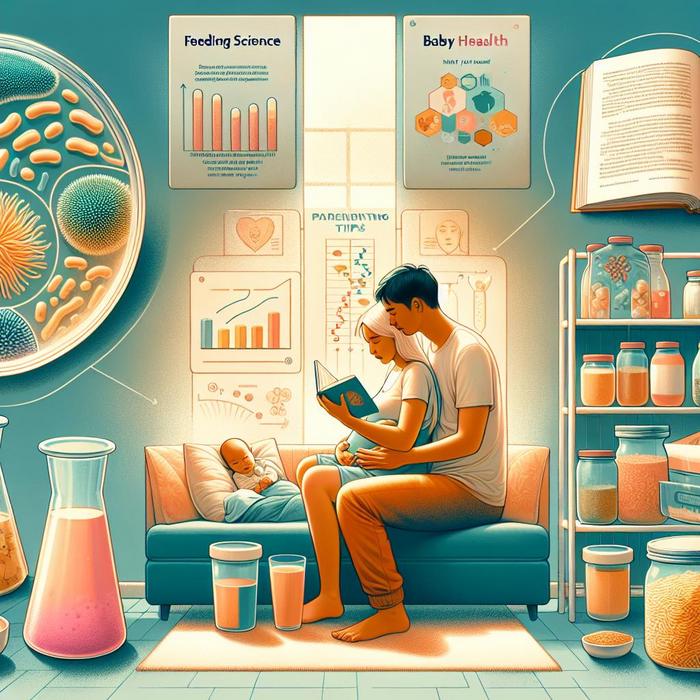The Intricacies of Feeding Science
Feeding is more than just a basic need. It is a complex process that, when understood properly, can greatly enhance your child’s health. This article delves into the fascinating world of feeding science, providing essential baby health tips that every parent should know.
Understanding the Science Behind Feeding
In feeding science, it’s essential to understand that nourishing your child involves more than just providing sustenance. It focuses on achieving optimal nutrient absorption, fostering a healthy relationship with food, and supporting overall development. Here are three key aspects:
- The nutrients: Different foods contain varying amounts of vital nutrients. It’s essential to provide a balanced and diverse diet to ensure your child receives all necessary nutrients.
- The absorption: A healthy digestive system is crucial for optimal nutrient absorption. By understanding how certain foods are processed, you can better cater to your child’s nutritional needs.
- The relationship with food: Cultivating a positive relationship with food early on can help prevent eating disorders and promote a healthy lifestyle.
Understanding your child’s dietary needs is crucial in fostering good health and development.
Feeding Science and Baby’s Health
Specific feeding methods and practices can impact your baby’s health and developmental milestones. Selecting appropriate tools, such as baby bottles, can enhance feeding experiences and benefit your baby’s health.
- Suitable feeding tools: The right baby bottle can aid digestion, reduce colic, and make feeding time enjoyable.
- Feeding schedule: A regular feeding schedule can help regulate your baby’s hunger signals, supporting a healthy metabolism and growth.
- Introducing diversity: Starting from six months, introducing diverse foods can help your baby get a wide range of nutrients and develop their palate.
Understanding these aspects can provide insight into feeding best practices and enhance your baby’s feeding experience.
Staying Informed through Parenting Knowledge
Keeping up-to-date with the latest feeding science is a crucial part of parenting knowledge. From understanding social media algorithms that drive parenting trends on platforms like Instagram, to reading up on expert advice, staying informed is vital.
Resources like the book ‘Complete Tubefeeding: Everything you need to know about tubefeeding, nutrition, and more‘ offer in-depth information on feeding aids, while studies discussing the feeding patterns of creatures like hummingbirds give unusual, yet enlightening insights into feeding mechanics.
With accurate social media insights and practical parenting knowledge, you can make the best feeding choices for your child.
Feeding Science and Nutrition
The role of nutrition in feeding science cannot be overstated. Offering nutrient-packed meals is essential in promoting your child’s growth and development. One such innovative dietary approach is baby-led weaning, which advocates letting infants control their solid food consumption through self-feeding, thereby promoting motor skills.
- Vital minerals and vitamins: These are integral for your child’s optimal growth, development, and immune functioning.
- Essential Fats: Particularly DHA and ARA are critical for brain and eye development.
- Protein: It is fundamental for growth, tissue repair, and immune function.
Developing a feeding plan that is centered around balanced and nutrient-dense meals will considerably enhance your child’s health.
Feeding Science and Dietary Modifications
If your child has specific health conditions or dietary restrictions, modifying their diet becomes essential. There are plenty of resources available, like general feeding guidelines, which can provide invaluable guidance during such situations.
- Limited sugar intake: Reduced sugar consumption is essential, as high sugar intake can increase the risk of obesity and other health complications. Numerous studies have indicated a link between high sugar intake and several types of cancer.
- Alkaline diet: An alkaline diet, which primarily focuses on consuming alkaline foods while reducing the intake of acidic foods, can improve overall health and help manage certain conditions. This approach helps maintain the body’s pH level at a healthy balance.
These adjustments are instrumental in ensuring that your child’s overall dietary needs are being met, despite any health conditions or dietary restrictions they have.
Feeding Science and Holistic Child Development
Understanding and implementing feeding science also impacts your child’s psychological, social, and cognitive development. It’s a comprehensive approach that intersects numerous domains of child development.
- Psychological development: Having regular and pleasant meal times can improve children’s emotional health, creating positive associations with food.
- Social development: Eating together as a family exposes children to social graces, table manners, healthy eating habits, and meal preparation skills.
- Cognitive development: The act of feeding engages various cognitive skills in younger children, including recognition, hand-eye coordination, and decision-making.
By focusing on feeding science, these vital areas of your child’s development can be greatly improved.
Final Thoughts on Feeding Science
Feeding science is an intriguing, multifaceted field that extends beyond the scope of mere sustenance. Considering facets like nutritional values, absorption, food relationships, feeding tools, dietary modifications, and child development allows parents to construct a comprehensive feeding plan that will immensely benefit their children’s health and development.
Through ongoing research and education, new aspects of feeding science continue to emerge, offering fresh insights into the science of feeding. Parents can take advantage of this knowledge to foster healthier feeding habits and support their child’s overall well-being.







